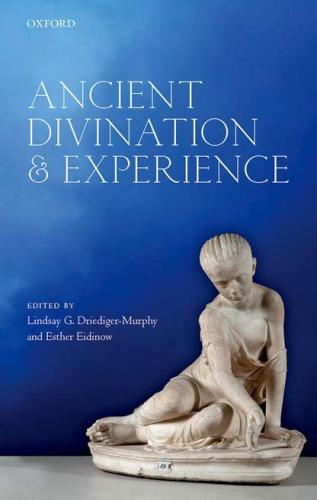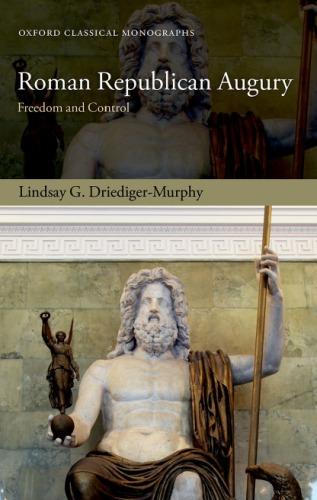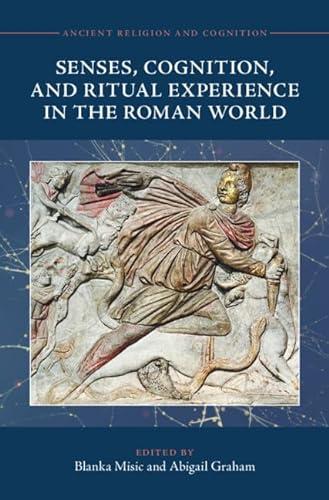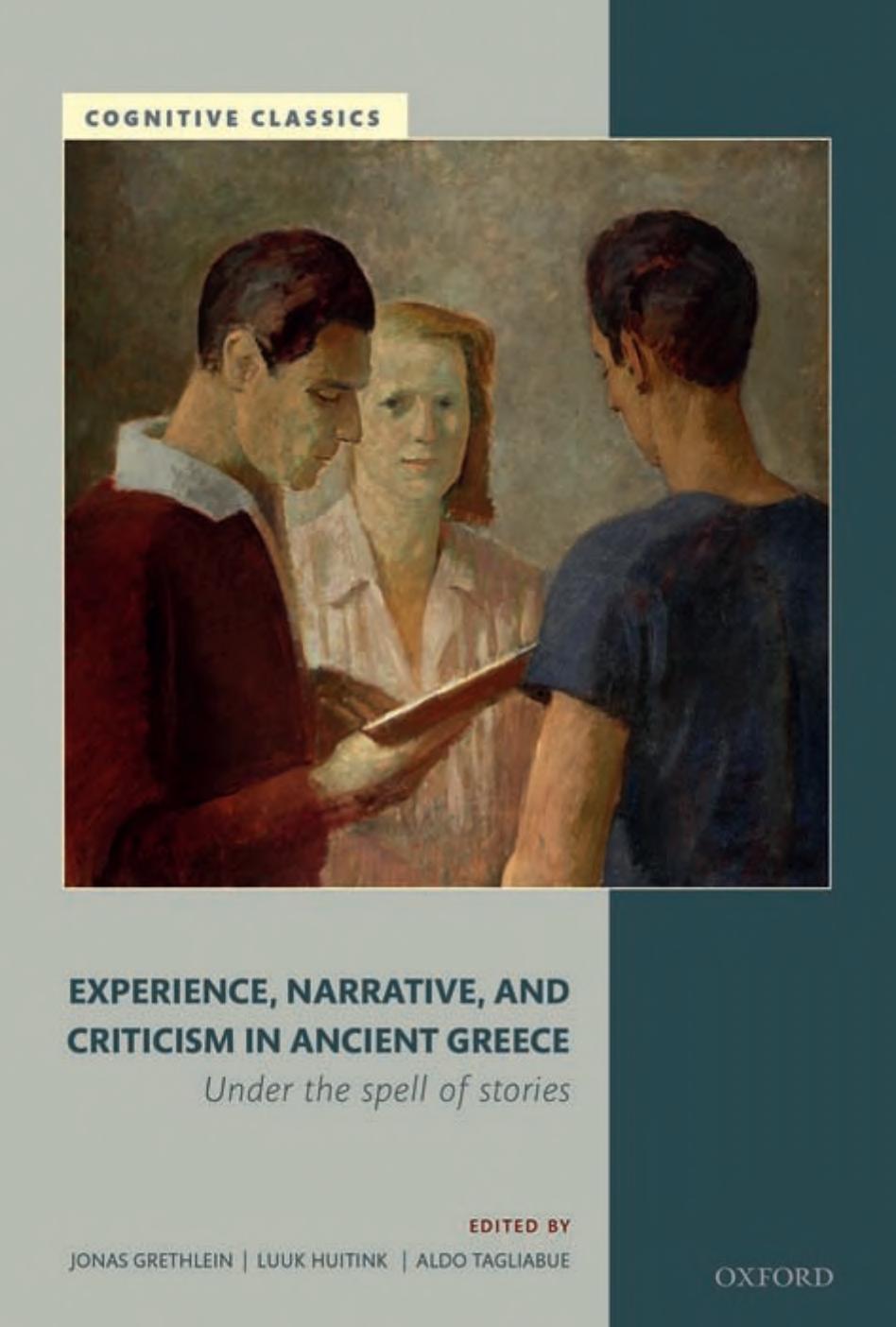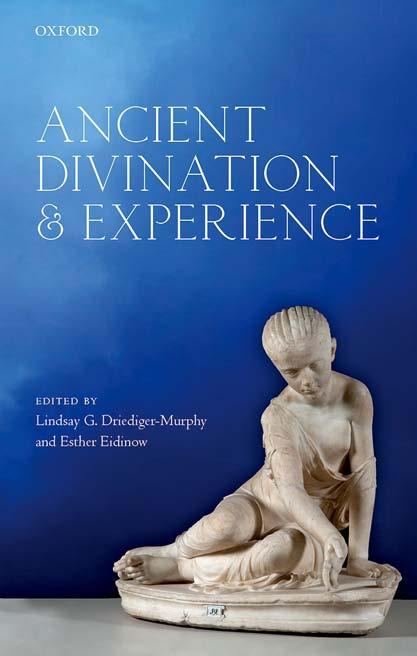ListofContributors
HughBowden isProfessorofAncientHistoryatKing’sCollegeLondon,wherehe teaches,andsupervisesPhDstudents,intheareaofGreekhistory,andGreek religion.Hehaswrittenbookson ClassicalAthensandtheDelphicOracle;Divination andDemocracy (Cambridge2005),and MysteryCultsintheAncientWorld (London andPrinceton2010),aswellasnumerousarticlesondivinationandonreligionand cognition.HealsoworksonAlexandertheGreat,andhaswritten Alexanderthe Great:AVeryShortIntroduction (Oxford2014).Hiscurrentprojectisbringing togetherthesetwoareasofresearch,inabookon TheReligionofAlexanderthe Great.
JasonP.Davies isinterimdirectoroftheArenaFellowshipschemeintheUniversity CollegeLondonCentreforAdvancingResearch-basedEducation.Hehastaught extensively,andpublishedparsimoniously,onancientculture,religionandhistoriography,beliefandsecularismintheancientworld,interdisciplinarity,threshold conceptsandhistoryandreceptionofscience,aspartofawideinterestinpeople’ s interactionswithknowledgesystems.Heiscurrentlyundertakinglong-termethnographicresearchondisciplinaryandpedagogicculturesinuniversitiesanddevelopingamonographaboutMaryDouglas’ CulturalTheoryandhighereducation.With EstherEidinowandSusanDeacy,heisaco-founderoftheTeachingandLearning AncientReligionsnetwork.
QuintonDeeley isSeniorLecturerinSocialBehaviourandNeurodevelopmentatthe InstituteofPsychiatry,Psychology,andNeuroscience(IOPPN),King’sCollege London.HeisalsoConsultantNeuropsychiatristintheNationalAutismUnitand NeuropsychiatryBrainInjuryClinicattheMaudsleyandBethlemHospitalsand chairstheMaudsleyPhilosophyGroupandtheSocialandCulturalNeuroscience GroupattheIOPPN.Hehasresearchedtherelationsbetweenculture,cognition,and brainfunctionsincehereceivedhisqualificationsintheologyandreligiousstudies fromCambridgeUniversity,andlatermedicineatGuysandStThomas’ Medical School,London,andpsychiatryattheMaudsleyandBethlemHospitals.DrDeeley bringscognitiveneuroscienceresearchmethodsintodialoguewithhumanities scholarshiptoimproveunderstandingofreligiouscognition,experience,andbehaviour.Currentresearchtopicsincluderesearchingvoicehearinginpatientgroupsand culturalpractitioners,andhowcognitiveandbrainprocessesinvolvedintheformationofbeliefsandexperiencescanbeinfluencedbyculturalpracticessuchasritual.
LindsayG.Driediger-Murphy isAssociateProfessorofLatinandRomanSocial/ ReligiousHistoryattheUniversityofCalgary,Canada.Herresearchinterestsinclude Romandivination,GreekandRomantheology,andpagan-Christianinteractionsin theancientMediterranean.Herpublicationsinclude RomanRepublicanAugury: FreedomandControl (OxfordUniversityPress,2019)andarticlesinsuchjournals as ZeitschriftfürPapyrologieundEpigraphik,Phoenix,and Greek,Roman,and ByzantineStudies. Hercurrentprojecton ‘TheNatureofRomanGods’,anexaminationoftheemotionallivesofRome’sgods,isfundedbytheSocialSciencesand HumanitiesResearchCouncilofCanada.
EstherEidinow isProfessorofAncientHistoryattheUniversityofBristol,UK.Her researchfocusesonancientGreekculture,especiallyreligionandmagic,andsheis particularlyinterestedinanthropologicalandcognitiveapproachestotheseareas. Sheistheco-founderandco-editorinchiefofthe JournalofCognitiveHistoriography.Aswellasnumerousarticles,herpublicationsinclude Oracles,Curses,and RiskamongtheAncientGreeks (2007), Luck,FateandFortune:Antiquityandits Legacy (2010),and Envy,PoisonandDeath: WomenonTrialinClassicalAthens (2016).
MichaelA.Flower isDavidMagie ’97Classof1897ProfessorofClassicsat PrincetonUniversity.HehasresearchinterestsinGreekhistory,historiography, andreligion.Heistheauthorof TheopompusofChios.HistoryandRhetoricinthe FourthCentury .. (Oxford1994), Herodotus,Histories,BookIX (withJohnMarincola,Cambridge2002), TheSeerinAncientGreece (Berkeley2008), Xenophon’ s Anabasis,ortheExpeditionofCyrus (Oxford2012),co-editor(withMarkToher)of Georgica:GreekStudiesinHonourofGeorgeCawkwell (London1991),andeditorof the CambridgeCompaniontoXenophon (Cambridge2016).
LisaMaurizio isanAssociateProfessorofClassicalandMedievalStudiesatBates College,Maine,USA.Sheresearchestheinterplaybetweengender,oralpoetry,and Greekreligion,andhaspublishedarticlesonDelphicdivinationaswellas Classical MythologyinContext (OUP,2015).
ScottB.Noegel (Ph.D.1995,CornellUniversity)isProfessorofBiblicalandAncient NearEasternLanguagesandLiteraturesintheDepartmentofNearEasternLanguagesandCivilizationsattheUniversityofWashington,adepartmentforwhichhe alsoservedaschairfrom2006to2015.Hehasauthored,co-authored,andedited ninebooksandmorethaneightyarticlesondiversetopicsrelatedtoancientNear Easternlanguages,literature,andculture.Todate,hehasgivenmorethan130public andscholarlylectures.Currently,heisworkingonamonographentitled ‘World Play’ inAncientNearEasternTexts.In2016,hegavethecommencementaddressfor hisalmamater,theUniversityofWisconsin-Milwaukee,whichawardedhimwithan HonoraryPhDinLettersforan ‘extraordinaryreputationasahighlydistinguished
scholar,musician,andartist’.Tolearnmoreabouthisprojectsortodownloadhis publications,visithttp://faculty.washington.edu/snoegel.
LisaRaphals (瑞麗)studiestheculturesofearlyChinaandClassicalGreece,with interestsincomparativephilosophy,religion,andhistoryofscience.SheisProfessor ofChineseandComparativeLiterature,UniversityofCaliforniaRiverside,cooperatingfacultyinthedepartmentsofPhilosophyandReligiousStudies,andserveson facultyoftheTri-CampusPhDprograminClassics.Sheistheauthorof Knowing Words:WisdomandCunningintheClassicalTraditionsofChinaandGreece (Cornell,1992), SharingtheLight:RepresentationsofWomenandVirtueinEarly China (SUNY,1998),and DivinationandPredictioninEarlyChinaandAncient Greece (Cambridge,2013).Representativescholarlyarticlesinclude: ‘SkepticalStrategiesintheZhuangziandTheaetetus’ (PhilosophyEast&West,1994), ‘Debates aboutFateinEarlyChina’ (ÉtudesChinoises,2014), ‘SunziversusXunzi:TwoViews ofDeceptionandIndirection’ (EarlyChina,2016),and ‘BodyandMindinEarly ChinaandGreece’ (JournalofCognitiveHistoriography,2017).
FedericoSantangelo isSeniorLecturerinAncientHistoryatNewcastleUniversity. HehastaughtandpublishedonvariousaspectsofRomanhistory,mostlyRepublican,andistheauthorof Sulla,theElitesandEmpire.AStudyofRomanPoliciesin ItalyandtheGreekEast (2007), Divination,PredictionandtheEndoftheRoman Republic (2013),and Marius (2016).Hehasalsoeditedseveralvolumes,including (withJ.H.Richardson) PriestsandStateintheRomanWorld (2011).HeisReviews Editorof Histos.
AndrewStiles receivedaBA(Hons)andMPhilfromtheUniversityofSydney,anda DPhilfromtheUniversityofOxford.HeiscurrentlyaTeachingFellowinAncient HistoryatUniversityCollegeLondon.Hisdoctoralresearchexaminesaseriesof crises(fromtheTriumviralperiodtotheFlaviandynasty)inwhichconceptionsof thefutureofRomewerearticulated,andexploresthehopesandfearsgeneratedby suchprojectionsandtheirinfluenceonpoliticaldevelopments.Hisbroaderresearch interestsincludethepolitical,social,andreligioushistoryoftheearlyPrincipate,and thehistoryofideasintheRomanworld.HehaspublishedarticlesonOvidand Germanicus,andthepoliticalsignificanceofthecultof Spes inAugustanRome.
Introduction
LindsayG.Driediger-MurphyandEstherEidinow
1. ‘YouBelieve;WeKnow’
ThisvolumeistheresultofaconferenceheldinLondon,inJuly2015,onthe topicofdivinationinancientcultures,withparticularfocusonGreeceand Rome.¹Theconferenceitselfarosefromthedesiretoexploreapproaches thatdivergedfromtheprevailingscholarlyfunctionalistanalysesofancient divination.Arecentsummaryofthestateofanthropologicalresearchinthis areawillcomeasnosurprisetoclassicists: ‘regardlessofwhetherdivination isconceivedofasameansforprovidingemotionalreassurance,atoolfor restoringandsustainingasocialstructure,aninstrumentformakingdecisions,buildingconsensus,andestablishingpoliticallegitimacy,oranaidfor maintainingacognitiveorder’,theassumptioninmoststudieshasbeenthat ‘divination[is]aderivationfrom,andrepresentationof,someunderlying processeswhichitservestocontrol’.²
Inscholarshipontheancientworld,thereisnodoubtthatsuchexplanationsrevealimportantsocio-politicaldimensionsofdivinatorypractice, buttheyalsoruntheriskofobscuringfromviewtheverypeople,ideologies, andexperiencesthatscholarsseektounderstand.Theproblemsraisedby thisapproachhaverecentlybeensummarizedbythereligiousstudiesand anthropologyscholarPatrickCurry:it ‘allowstheobserver-theoristtodistancehim-orherselffromthesubjectmatteranditshumansubjects,and thentoinformthemwhattheyare “really” doing.Youbelieve;weknow.’³In contrast,thepapersatthisconferencesoughttore-examinewhatancient
¹TheeditorswouldliketothanktheInstituteofClassicalStudiesfortheirgenerous sponsorshipoftheconference,andthefollowingfortheirsupportofthisproject:Simon Hornblower,CharlotteLoveridge,GeorginaLeighton,theproductionteamatOUP,andthe contributingauthorsofthisvolume.Thisproject(researchandvolume)wassupportedbythe AHRC,theLeverhulmeTrust,andtheSocialSciencesandHumanitiesResearchCouncilof Canada.
²Myhre2006.³Curry2010:4.
LindsayG.Driediger-MurphyandEstherEidinow, Introduction In: AncientDivinationandExperience Editedby:LindsayG.Driediger-MurphyandEst herEidinow,OxfordUniversityPress(2019).
©OxfordUniversityPress.
DOI:10.1093/oso/9780198844549.003.0012
people primarilythoseinancientGreekandRomancommunities,butalso MesopotamianandChinesecultures thoughttheyweredoingthrough divination,andwhatthiscouldtellusaboutthereligionsandculturesin whichdivinationwaspractised.Contributorstothe2015conferencewere askedtoengagewithoneormoreofasetofsharedquestions:
• Whatkindsofgodsdoancientformsofdivinationpresuppose?
• Whatbeliefs,anxieties,andhopesdiddivinationseektoaddress?
• Whatwerethelimitsofhuman ‘control’ ofdivination?
• Whatkindsofhuman–divinerelationshipsdiddivinationcreate/sustain?
2.BeyondFunctionalism
Previousscholarshipondivinatorypracticesofcoursecomprisesmany, differentiated fields:theapproachestakenbythetwodisciplinesofGreek andRomanhistory,justasanexample,havebeenintriguinglydissimilar.In researchonancientGreekdivinationor mantikē,scholars,movingbeyond theearlier,moredescriptiveordocumentaryapproachestoancientdivination,havedrawnontheresourcesofanthropologytoexplorethewaysin whichapracticethatat firstsightseemstomakelittlesense,canbeviewedas quite ‘rational’ withinthecognitiveconstraintsofitsownculture.⁴ Although thebinarycategoriesofrationality/irrationalityarenolongerdeemedrelevant inthesediscussions,⁵ scholarshave,ingeneralpursuedafunctionalistlineof analysis,seekingthesocio-politicalimplicationsofdivination.⁶ Thus,ithas
⁴ Ethnologistsandanthropologistsofthenineteenthandearlytwentiethcenturiesledtheway inprovidingdetaileddescriptionsofdivinatorypracticesandexperiencesinmanycultures. Wheninterpretingthisdata,however,thosestudiestendedtoexplaindivination’sinfluenceand theexperiencesitgeneratedastheresultof ‘primitive’ or ‘pre-scientific ’ worldviews(e.g.Tylor 1871;Frazer1906–15[1890];Lévy-Bruhl1951[1910]).Suchinterpretationshavelongsincebeen discarded.Descriptiveapproaches:someexamplesincludeRoux1946;Amandry1950;Parke 1939,1967a,1967b,1985;ParkeandWormell1956;Günther1971;Fontenrose1978.Rationality: Vernant1974:18–19representstheoracleasaformofrationalitythatisconfrontedbythe rationalityofGreekpoliticalstructure;cf.Burkert2005:esp.30onrationalityvs.irrationality.
⁵ Cf.themoreschematicoverviewofcurrentscholarshipinStruck2016.
⁶ AfamousexceptiontothisisVernantetal.1974;thisismentionedinJohnstonandStruck 2005.Johnston,intheintroductiontothatvolume,raisesthewaythat ‘divinationalsohelpsus tounderstandthementalitiesthatorganizeotheressentialaspectsofhumanexistence’ (p.11). Mostrecently,Trampedach(2015)hasexamineddivinationasa ‘Kommunikationsphänomen’ (p.14),andexploreditsrolenotonlyinvariouspoliticalstructuresandinthedevelopmentof politicalrationality(p.564),butalsointherelationshipthatthiscommunicativephenomenon instantiatedbetweenmenandgods.
generallybeenagreedthatcommunitiesconsultedoraclesbecausethey soughttoresolvetheirinternaldifferencesviaanunbiasedauthority,usually locatedoutsidethecity.⁷ Divinationprovidedamodeofachievingconsensus,and,assuchit ‘alsoservesforthescholar,asanindicationofwhere legitimationismostnecessary’ . ⁸ Inturn,scholarshavearguedthatindividualssoughtandfoundindivinationaheightenedsenseofpersonalcontrol.⁹ Incontrast,althoughstudiesofRomandivinationhavetypicallyengaged lessexplicitlywiththeanthropologicalliterature,theytoohavetendedto focusonthesocialandpoliticalfunctionsservedbydivination.Thevarious formsofpublicdivinationatRome(augury,state-sanctionedharuspicy,and prodigy-interpretation)haveattractedparticularattention.Suchformsof divinationaresaidtohaveenhancedmagisterial,senatorial,orimperial authority;tohavecalmedpanicandvalidateddecisionstakenbyofficials andsenate;tohaveenforcedmagisterialsubmissiontothesenateand priestlybodies(particularlyintheRepublic);tohavestrengthenedclaims topoliticallegitimacy(aphenomenonespeciallywelldocumentedinthe Imperialperiod);tohavehelpedRomanstocopewithsituationsofuncertaintyandhelplessness;andtohavecreateddelayinordertobuy ‘breathingspace ’ forcalmerandmorereasoneddiscussionand/ortheapplicationof ‘ peer-pressure ’.¹⁰ Formsofpublicdivinationhavealsotendedtobeseen aboveallasatooloftheelite,employedbythepoliticalauthoritiestobolster theirpoweroverthelowerorders,bythesenatemajoritytocompelindividualpoliticians’ adherencetoanemergingconsensus,bytheindividual
⁷ Forexample,Morgan1990:esp.184–5;Parker2000;Rosenberger2001emphasizes culturalbehavioursandtechniques.
⁸ Johnston2005:23.
⁹ RüpkefollowingTurner(2005b(vol.3):1443);Burkert2005:30.
¹
⁰ Afewexamples:Vernant1974:10(divinationmakesdecision-makingappearmore ‘objective’);Liebeschuetz1979:8ff.;Wardman1982:20,45;Scheid1985:46(augurylegitimated publicdecisions);Gordon1990:192–3(religionasa ‘veil’ concealingthe ‘real-worldforces’ [i.e. actionsoftheelite]thattrulyshapedevents);North1990:64–5(divinationcouldvalidatepublic decisions,thoughnotehiscriticismsofLiebeschuetz’semphasisonthis);Dowden1992:35; Orlin1997:90–1(consultationsoftheSibyllineBookscalmedpanicandvalidatedsenate decisions,thoughherecognizesthatconcernaboutthegodscouldalsoplayarole); Rosenberger1998;Rüpke2005a(divinationboughttimeforthenegotiationofeliteconsensus); Rüpke2005b:1443–4(divinationaspsychologicalaid,socialprocess,andsymbol),1450 (divinationas ‘Widerspruchsschleifen,dieinsgesamtdenEntscheidungsprozeßinRichtung Konsensoptimieren’);Rüpke2012:479:divinationis ‘uneformedecomportementcollectifqui, ensituationd’incertitude,àl’aidederolessociauxdéfinispourl’interprétationetl’élaboration rituelledesignesstandardisés,rechercheetarticulel’accordetledésaccord.’ Notethatthe applicabilitytoRomeofthe ‘controlofhelplessness’ theoryprominentinstudiesofGreek divinationisquestionedbyNorth1990:62–4.
magistratetoalterthebehaviourofhisrivalsandopponents,orbythe individualclaimanttopowertobolsterhisowncase.
Ourintentionisnottodismisstheseinsights,buttohighlightother aspectsofancientdivinationwhichsuchfunctionalistapproacheshave tendedtooverlook.RecentdevelopmentsinClassics,anthropology,and cognitivescienceencourageprogressinseveralnewaspectsofexploration. Inthedisciplineofanthropology,severalscholarshaveofferedproductive critiquesofanexcessiverelianceonfunctionalistinterpretationsofdivination,¹¹criticismwithwhichClassicshasnotyetfullyengaged.Inthe disciplineofcognitivescience,studiesofbrainactivityduringperceived religiousexperiencessuggestthatthesecanbeunderstoodwithoutassuming manipulation,hypocrisy,ordeceptiononthesubject ’spart.Researchinto ancientGreekandRomandivinationisalsoexploringmoreanddifferent dimensionsthanbefore.Forexample,scholarsofancientGreekdivinatory practiceshavebeguntoexaminedivinatoryactivities,ordiscourseconcernedwiththeseactivities,aswaysforhumanbeingstoexpressparticular aspectsoftheirrelationshipandinteractionswiththeirenvironment an environmentthat,ofcourse,includedthedivine.¹²OntheRomanside,there isagrowingrecognition,drawingoncritiquesofthe polis-religionmodel,¹³ thatevenpublicreligionwasnotsimplythepreserveoftheelite.For divinationtofulfilthefunctionswetypicallyascribetoit,itmusthave dealtinsymbols,concerns,andideaswhichresonatedbothwiththosein powerandthose(oflowersocialstatus)whosesupportkeptthemthere.¹⁴ TherehasalsobeenaburstofinterestinthediversityofreligiousexperiencesandactorsinbothGreekandRomancontexts:inthereligionof familiesandindividuals,inthekindsofemotionsproducedbyreligion, andinbeliefsandactivitieswhichourelitesourcesmaydepictas ‘fringe’ or ‘deviant’,butwhichmayhaveplayedalargerroleinthelifeoftheancients thanthischaracterizationsuggests(andwehaverecognized).¹⁵ Theessaysin thisvolumeengagewiththeseadvancestoidentifyandelucidatepreviously
¹¹SeeespeciallythepaperscollectedinCurry2010.Foranexampleofhowacomparative anthropologicalapproachmaybeusedtoconsiderfeaturesofdivinationacrossseveralancient Mediterraneancultures,seeBeerden2013,withHarrison2015aandEidinow2015.
¹²Eidinow2007examinesbothdivinationandbindingspellsaswaysofexpressingand respondingtoculturallyconstructedconceptionsofrisk;Struck2016analysesphilosophical textsondivinationasreflectionsonintuitiveknowledge;onoracularnarratives,seeDougherty 1992,Maurizio1997,andKindt2016.
¹³E.g.Bendlin1997;Woolf1997;Bendlin2000;Kindt2012.¹⁴ Ripat2006.
¹⁵ Parker2011:224–64;Chaniotis2012;ChaniotisandDucrey2013;Rüpke2013;Scheid 2013(Englishedition2016);Santangelo2013;Whitmarsh2015.
understudiedaspectsofancientdivinatoryexperienceandpractice.Special attentionispaidtotheexperiencesofnon-elites,thetheologicalcontentof divination,thewaysinwhichdivinatorytechniquescouldsurprisetheir usersbyyieldingunexpectedorunwantedresults,thedifficultiesofinterpretationwithwhichdivinatoryexpertswerethoughttocontend,andthe possibilitythatdivinationcouldnotjustease,butalsoexacerbate,anxietyin practitionersandconsultants.Byanalysingtheseaspects,wesuggest,itis possibletoexaminehowancientdivinationworked,andexplorewhatthis cantellusaboutwhatmatteredtotheindividualsandculturesthatusedit,¹⁶ withoutadoptinguncriticallythe ‘emic’ perspectiveofoursubjects,or simplydescribingtheexperiencesofindividualusersofdivination.¹⁷
3.SimilaritiesandDifferences
Theessaysinthisvolumecoverarangeoftimesandplaces:thoseonancient GreekcultureexamineArchaic,Classical,andHellenisticevidence;thoseon RomanculturesencompasstheRepublicantotheImperialperiods.The editorselectednottoextendintoLateAntiquity,sinceitseemstousthat divinatoryritualsofthatperiodbegintoraisemarkedlydifferenttheological questions.Wehave,however,includedherethreeessaysthatareintendedto provideproductivecomparativeinsights.Thecoverageofculturesinthe volumereflectstheexpertiseoftheconferenceparticipants.Comparative datafromotherancientcultures(e.g.Jewish,Egyptian)wouldenrichthe picturefurther,andwehopethatthisvolumewillinspirefurtherworkinall oftheseareas.Ourgoalhereisnottoprovidecomprehensivetreatmentof divinationinallancientculturesbuttoshowhownewapproachesto divinationcanyieldnewinsightsinthestudyofmanyancientpeoples. Theessaysreflectonabroadrangeofdivinatorypractices,includingnot onlyoracles(Eidinow,Deeley,Maurizio,andRaphals),butalsodreams
¹⁶ Theplaceofindividualchoiceineverydayengagementinancientreligionshasbeen emphasizedbyJörgRüpke’ s ‘LivedAncientReligion’ project(UniversityofErfurt).Someof theparticipantsinthatprojectwerealsoinvolvedinRosenberger2014,whichconsideredthe roleoftheindividualinancientGreekdivination.Theessaysinthisvolumebuildonthistheme tooffersomenewexamplesofhowdivinationinfluencedthelivesofindividuals(aswellas groupsandsocieties)inseveralancientcultures.
¹⁷ Emicperspectives:Fordiscussionofthelimitationsof ‘emic’ approachestoreligions,see e.g.Versnel1991;McCutcheon1999;Johnston2003;McCutcheon2007:ch.6.Ondescriptive approaches,seen.4above.
(DaviesandBowden),epiphanies(Flower),omens,prodigiesandportents (Noegel,Santangelo,andStiles),andsacri fice(Driediger-Murphy).Thisisa reminderofthevarietyofmechanismsavailableforindividualsandcommunitiestogainaccessto(whatwasperceivedasdivine)revelation,butitis notintendedtobeanimplicitassertionthatthesepracticesaresimplythe same.Eachstudyacknowledgesthespecificsofthesedifferentactivities,in termsofnotonlytheactivitiesinvolved,butalsothecontextsinwhichthey occurredandtheimplicationstheyconveyedinandforthosecontexts. Indeed,acknowledgingthattheseessayscouldhavebeenorganisedina numberofdifferentways,wehavearrangedthemsoastodrawattentionto someofthesespecificsandtheresultingquestionsthattheyraiseformodern scholarship.However,wehopeourreaderswill findotherthemesacrossthe essaysthatmaysuggestdifferentcommonalities.
Thus,thefouressaysinPartI:ExpertiseandAuthority,examinethewaysin whichancientsocietiesattributedauthorityandclaimedexpertise,inthe fieldof divination.ScottNoegelandHughBowdenbothseekthediviners’ perspectives, elucidatingsomeofthedifficultiesofinterpretationwithwhichdivinatory expertswerethoughttocontend.Noegel’schaptertakesustotheNearEast, examiningauguryfromthepractitioner’sownsocial,economic,andcosmologicalperspectives,andexploringhowdivinersnegotiatedtwomajorsources ofanxiety scepticismfromothersandtheirowntheologicalprinciples.BowdenbringsusfromtheNearEasttoClassicalAthens,andthecaseofEuxenippos,whowassentbytheAthenianstoconsulttheoracleofAmphiaraosat Oropostohelptoresolvealanddispute andwasprosecutedforhisinterpretationofhisdivinatorydream.BowdenchallengestheideathatEuxenipposwas regardedsimplyasaprivatecitizenand,withtheaidofmodernstudiesof dreamsanddreaming,suggestsinsteadthathemayhavebeenan ‘expert dreamer’,challengingcategoriescommonlyusedinstudiesofGreekdivination.
Inturn,EidinowandDaviesfocusonthewaysinwhich,ontheonehand, trustinauthority,andontheotherhand,locating(theright)expertise,were challengesforthosewhoconsulteddivinatoryexperts.Inpart,theaimof Eidinow’schapteristorehabilitatetheLydianking,Kroisos,sooften accusedofunGreekbehaviourbecauseofhisso-called ‘testoftheoracles’ . Shedoesthisbyexploringtheroleofuncertaintyinoracularconsultations, andexaminingthewaysinwhichtheGreekssoughttoresolveitthroughthe practiceofposingmultiplequestions(seriallyatoneoracle,orsimultaneouslyandsuccessivelyatdifferentoracles).Daviesarguesthatwhathas longbeenseenasancientdebateaboutwhether(all)dreamsdidordidnot countasmessagesfromthegods,canbebetterunderstoodasanattemptby
eachindividual,intheirspecificcontextandcircumstances,todetermine which dreamsweresignificant,bydeployingwidelysharedstrategiesof interpretation.Returningtothemesraisedin,forexample,Bowden’schapter,Daviesdrawsattentiontothewaysinwhichdreams,whileappearing ‘to beaprivateevent’ were,intermsoftheirreception,interpretationand response, ‘apublictransaction,andhowonerespondedtothemwas emphaticallyasocial,religiousandpoliticalact’ . Theseessaysraisequestionsaboutthemeaningsattributedtosigns,and thecontrolofthoseinterpretations,andthisisthethemeoftheessaysin PartII:SignsandControl.Mauriziointerrogatestheevidenceforthe argumentthatthePythiaatDelphiusedsortition and findsitwanting. Sheexploreshowanthropologicalstudiessuggestthatdivinatorypronouncements ‘extendthereflectioninstigatedbytheconsultation’ ,aprocess whichisunlikelytoleadtoaswiftresolutionofaproblem andwhich continuestheconsultant’sprocessofreflectionandinterpretation,aswellas theirstateofuncertainty.WemovefromGreecetoRomeforthenextthree essays: first,StilesexploreshowtheRomanreceptionandinterpretationof signsreportedinthepast(inthiscase, ominaimperii,signspertainingtothe ruleofindividualemperors)couldchangeovertimeinresponsetochanging anxietiesaboutthefutureandthegods’ perceivedplansfortheRoman Empire.Heplacesspecialemphasisontheoften-overlookedroleand experiencesofnon-elitesastheycreatedtheirowninterpretationsofsigns pertainingtothoseinpower.Second,Santangeloexploresthefateof prodigy-interpretationundertheEmpire,challengingthelong-heldview thatRomanemperorsdiscouragedreportsofunfavourablesigns.Heargues insteadthattheprodigy-system(anditsattendantquestionsaboutthegods’ intentionstowardsthestate)remainedavitalpartofRome’snegotiation withthedivine.Finally,Driediger-Murphyqueriesthecurrentconsensus thatRomandivinatorysacri ficesgenerallyproceededuntilafavourable signwasobtained(usqueadlitationem).ShearguesthatRomanmagistrates tooksignsfromfailedsacrificesmoreseriouslythanwehaveoftenthought, andthatthisbehaviourcanbereadasevidencethattheywereanxious abouttheirrelationshipwiththeirgods.Theseessaysdrawattentionnot onlytotheimportancebutalsotothediversityofsign-interpretationinthe ancientworld,stressingtheevidenceintheancientsourcesforthefeltneed torespondtoperceiveddivinecommunications,andtheanxietiesthese mightprovoke.
TheessaysinPartIIIbuildonthisquestionofthenatureofinteractionswiththedivine,andfocusonevidencefortheperceptionofDivine
Presence.Flowerusesdivinationasacasestudyforaninvestigationof ancientreligiousexperienceandtheideathattheGreekstookforgranted ‘therealpresenceofthedivine’.HefocusesonthepaeanofIsyllos,which describesthatpoet’sexperienceofadivinatoryepiphanybythegodAsklepios. Usingcomparativeanthropologicalstudies,hearguesthat ‘abeliefinthe realpresenceofthedivineandinthecertainefficacyofsupernaturalpower isundoubtedlyacross-culturalphenomenon’.Thenexttwochapters explorethisidea:Deeley’schapter(commissionedforthisvolume)draws onhisworkasaconsultantpsychiatristtoexamineexperiencesinwhichthe senseofcontrol,ownership,andawarenessofthoughts,speech,andaction arereattributedtoanotheragent.Heshowshowthesephenomenaarelikely tobecommonerandmorediversethanscholarshiponceassumed,andhe arguesthatunderstandingtheformsofexperience,attributedsignificance, andcausalprocessesinvolvedinApollo’scommunicationthroughthe Pythia,maytransformourapproachtothePythia’spossessionbyApollo. Finally,Raphals ’ inquiryexploresbothChineseandGreekevidence: first, sheexploresthenatureofChinese ‘manticquestions’,then,theuseofGreek oracularresponses.Throughtheseinquiries,sheexamineswhether,ineach case,divinationsoughthumanconsensusordivinesanction,andtowhat extentpractitionerssoughttokeepawayfrom,ortoinfluence,theirsupernaturalinformants.
Acrossthevolume,ratherthanclaimingtoidentifyanddescribethe religiousexperiencesofindividuals,eachchaptersetsouttoexamine theevidenceforthecognitivestatesofthoseengagedwiththeseactivities thebeliefs,anxietiesandhopesofconsultants.Buttheyalsomovebeyond considerationofdivinationasamechanism,toacknowledgeandexplorethe kindsofhuman–divinerelationshipsthatdivinationcreatedandsustained: whatkindsofsupernaturalentitiesdidthesepracticespresuppose,what varietyofformsofinteractiontookplacewiththoseentities,andhowwere thoseinteractionsstructured?Astheessaysdemonstrate,differentcultures andcontextsadopteddifferentapproachestoattemptingtocommunicate withthesupernaturalforcestheysawasbeingatworkintheirenvironment. WhileGreeksandRomanstendedtoseedivinationasmadepossibleby gods,theseprocessesalsocreatedroomforchanceandforuncertainty, bothonthelevelofthedivinecommunicationitself,asEidinowargues, andthroughpracticalstrategiessuchascastinglots,asLisaMaurizio exploresinherchapter.InancientChinesedivination,bycontrast,Lisa Raphalsarguesthattheputativeroleofthedivinewaslesspronounced thanthequestforhumanconsensus.Thestructuringofrelationships
betweenhumananddivinewasalsoshapedbyeachculture’sandcontext’ s understandingoftheroleofhumanbeingsinthedivinatoryprocess.From AthenstotheancientNearEast(asshowninHughBowden’sandScott Noegel’schapters,respectively),societiesthatpractiseddivination,especiallyinpublicdecision-makingprocesses,wereforcedtoaskwherethe ultimateauthorityininterpretingdivinatoryresultsshouldlie.Althoughthe exactsocialstatusandinfluenceofusersofdivinationmaydifferfrom culturetoculture,theseessayshighlighttheimportanceofunderstanding divinationnotjustinpragmaticorfunctionalisttermsasatoolforbuilding socialcohesionandspreadingcalm,butalsoasapotentialsourceofanxiety andpressureforthosewhousedit.
4.DivineandDivinatoryInterventions
Oneofthemostinterestingthemesthatemergedduringtheconference discussions,acrossawiderangeofpapers,wastheextenttowhichancient peopleuseddivinationgenuinelytoseekinformationaboutthefutureor fromthedivine.Insomeways,thiscanbeseenasoneaspectofthepuzzling questionofthenatureof ‘religiousbelief ’ inancientcultures,whichhas relativelyrecently(re-)emergedasapressingquestioninscholarshipin Classics.¹⁸ Inourconferencediscussions,thequestionsthatwereraised centredonwhetherancientusersunderstoodtheprimaryaimofdivination asmakingcontactwiththedivine,or,morespeci ficallygatheringinformationfromthegods,incontrasttothesocio-politicalfunctionsonwhich scholarshavetypicallyfocused.¹⁹
ThatGreekandRomantextsidentifycontactwiththedivineinorderto gaininformationasanostensibleaimofdivinationisnotindoubt:one thinks,forexample,ofXenophon’sdescriptionofdivination(‘[Thegods] knowallthings,andwarnwhomsoevertheywillinsacrifices,inomens,in voices,andindreams.Andwemaysupposethattheyaremorereadyto counselthosewhonotonlyaskwhattheyoughttodointhehourofneed,
¹⁸ In2006,theUniversityofOxfordandPrincetonUniversitycollaboratedinaseminar serieson ‘FaithinReligionsoftheAncientWorld’;recentpublicationsonGreekandRoman beliefincludeNorth2010;Versnel2011;Harrison2015b;Champion2017.
¹⁹ Inthiscontext,LisaRaphals’ chapterraisesastimulatingpointofprovocation,sinceshe arguesthat ‘gods’ werebyandlargeabsentfromChinesemanticpractice;nevertheless,the categoryof ‘spirits’ that,asitwere,taketheirplace,doescomprisebothgodsandancestors.
butalsoservethegodsinthedaysoftheirprosperitywithalltheirmight ’);or Cicero’sdescriptionofthe ‘predictionandknowledgeoffutureevents’ made possiblebysomeformsofdivinationas ‘asplendidandhelpfulthing if onlyitexists sincebyitmortalnaturemayapproachveryneartothe powerofthegods’.²⁰ Thequestionishowmuchweightthisstatedaim actuallyheldinthebalanceoffactorsthatdroveinstancesofdivinatory consultation.QuintonDeeley’schapterrevealshowthequestionssurroundingasenseofdivinepresencehaveremainedasourceoffascination,and,as aresult,afocusofscientificstudy.Hisconclusionssupporttheother chaptersinthisvolume,whichsuggestthatweshouldallocatemoreweight tothisfactorinourreconstructionsofwhatancientpeoplethoughtwhen performingdivination,thanwehavedoneheretofore.
OntheGreekside,MichaelFlower’schapter,forexample,remindsus thatonegoalofdivinationmayhavebeentoexperiencemoreintenselythe presenceofthegods,evenifourevidencemakesitdifficulttoreconstruct exactlyhowthatpresencewasperceived.EstherEidinowarguesthat repeatedconsultationsoforacles,orposingthesamequestiontomultiple oracles,canbeseennotasanattempttorigtheresultoftheenquiry,butas anattempttogainmoreaccurateintelligencefromthegodsinthefaceof inherentuncertainty.Inthe fieldofRomandivination,FedericoSantangelo’schapterre-examinestheevidenceforprodigy-interpretationintheEarly Principate,arguingagainstthetraditionalassumptionthattheemperors movedawayfromthispracticewhenitdidnottellthemwhattheywantedto hear.AndrewStilesapproachestheissuefromtheotherside,showingthat evensign-storieswhichlooklikestraightforwardattemptsatlegitimationby aspiringemperorscanalsobeunderstoodastheeffortsofthoseemperors’ subjects(botheliteandnon-elite)toidentifyandexplainthegods’ putative roleinbringingsuchmentopower.
Ifthereisoneoverarchingconclusionwemightdrawfromtheessaysin thisvolume,itseemstoustolieintheemergingfactthatGreeks,Romans, Babylonians,andancientChinesepractitionerswereusingdivinationto seeksomekindoftruth.Wemaythinkwe ‘know’ howandwhythey
²⁰ Xen. Eq.Mag. 9.8–9(trans.Marchant); Cic. Div. 1.1.Seealso Div. 2.130,where ‘Marcus’ invokesChrysippus’ (Stoic)viewthattheduty(officium)ofdivinationis ‘toknowinadvance thedispositionofthegodstowardsmen,themannerinwhichthatdispositionisshownandby whatmeansthegodsmaybepropitiatedandtheirthreatenedillsaverted’ (transl.Falconer).See discussionFlower2008:73.Notethatpredictingthefuturewasnotnecessarilytheaimofmany formsofdivinationintheancientworld(GreekorRoman):onpredictioninRomanculture,see Santangelo2013;ondivinationasawayof findingoutwhatishidden,Eidinow2007:43–4.
foundorfailedto findit;wehopethatthechaptersinthisvolumemay contributetofurtherdebateaboutwhattheancientsthemselvesthought theyweredoing.
References
Amandry,P.1950. LaMantiqueapollinienneàDelphes:Essaisurlefonctionnementdel’Oracle.Paris.
Beerden,K.2013. WorldsFullofSigns:AncientGreekDivinationinContext. Leiden.
Bendlin,A.1997. ‘PeripheralCentres – CentralPeripheries:ReligiousCommunicationintheRomanEmpire’.InH.CancikandJ.Rüpke(eds.), Römische ReichsreligionundProvinzialreligion, 35–68.Tübingen.
Bendlin,A.2000. ‘LookingBeyondtheCivicCompromise:religiouspluralismin laterepublicanRome’.InE.BisphamandC.Smith(eds.), ReligioninArchaic andRepublicanRomeandItaly:EvidenceandExperience,115–35.Edinburgh. Burkert,W.2005. ‘Signs,CommandsandKnowledge:AncientDivination betweenEnigmaandEpiphany’.InS.I.JohnstonandP.T.Struck(eds.), Mantikê:StudiesinAncientDivination,29–50.Leiden.
Champion,C.B.2017. ThePeaceoftheGods:EliteReligiousPracticesinthe MiddleRomanRepublic. Princeton,NJ.
Chaniotis,A.(ed.)2012. UnveilingEmotions:SourcesandMethodsfortheStudy ofEmotionsintheGreekWorld.Stuttgart.
Chaniotis,A.andDucrey,P.(eds.)2013. UnveilingEmotionsII.Emotionsin GreeceandRome:Texts,Images,MaterialCulture.Stuttgart. Curry,P.(ed.)2010. Divination:PerspectivesforaNewMillennium.Farnham. Dougherty,C.1992. ‘WhenRainFallsfromtheClearBlueSky:Riddlesand ColonizationOracles’ , ClassicalAntiquity 11.1:28–44. Dowden,K.1992. ReligionandtheRomans.Bristol.
Eidinow,E.2007(revppb2013). Oracles,Curses,andRiskamongtheAncient Greeks.Oxford.
Eidinow,E.2015. ‘ReviewofBeerden, WorldsFullofSigns:AncientGreek DivinationinContext’ , Gnomon 87:661. Flower,M.2008. TheSeerinAncientGreece. Berkeley,CA.
Fontenrose,J.1978. TheDelphicOracle:ItsResponsesandOperationswitha CatalogueofResponses.Berkeley,LosAngeles,London.
Frazer,SirJ.G.1906–15. TheGoldenBough.12vols.Thirdedition.London. Orig.pub.1890.
Gordon,R.1990. ‘FromRepublictoPrincipate:Priesthood,ReligionandIdeology ’.InM.BeardandJ.A.North(eds.), PaganPriests:ReligionandPowerin theAncientWorld,179–98.London.
Günther,W.1971. DasOrakelvonDidymainhellenisicherZeit.Tübingen.
Harrison,T.2015a. ‘ReviewArticle:Beyondthepolis?NewapproachestoGreek religion’ , JournalofHellenicStudies 135:165–80.
Harrison,T.2015b. ‘Ritualvs.Belief ’.InE.EidinowandJ.Kindt(eds.), The OxfordHandbookofAncientGreekReligion,21–8.Oxford.
Johnston,S.I.2003. ‘DescribingtheUndefinable:NewBooksonMagicandOld ProblemsofDefinition’ , HistoryofReligions 43.1:50–4.
Johnston,S.I.2005.[2015]. ‘Introduction:DiviningDivination’.InS.I.Johnston andP.T.Struck(eds.), Mantikê:StudiesinAncientDivination,1–28.Leiden.
Kindt,J.2012. RethinkingGreekReligion.Cambridge.
Kindt,J.2016. RevisitingDelphi:ReligionandStorytellinginAncientGreece. Cambridge.
Lévy-Bruhl,L.1951. LesFonctionsmentalesdanslessociétésinférieures.Ninth edition.Paris.Orig.pub.1910.
Liebeschuetz,J.H.W.G.1979. ContinuityandChangeinRomanReligion. Oxford.
Maurizio,L.1997. ‘DelphicOraclesasOralPerformances’ , ClassicalAntiquity 16.2:309–43.
McCutcheon,R.T.1999. TheInsider/OutsiderProblemintheStudyofReligion: AReader.LondonandNewYork.
McCutcheon,R.T.2007. StudyingReligion:AnIntroduction.Abingdonand NewYork.
Morgan,C.1990. AthletesandOracles:TheTransformationofOlympiaand DelphiintheEighthCenturyBC.Cambridge.
Myhre,K.C.2006. ‘Divination andExperience:ExplorationsofaChaggaEpistemology’ , TheJournaloftheRoyalAnthropologicalInstitute 12.2:313–30.
North,J.A.1990. ‘DivinersandDivinationatRome’.InM.Beardand J.A.North(eds.), PaganPriests:ReligionandPowerintheAncientWorld, 51–71 London.
North,J.A.2010. ‘Paganritualandmonotheism’.InS.MitchellandP.van Nuffelen(eds.), OneGod:PaganMonotheismintheRomanEmpire, 34–52. Cambridge.
Orlin,E.M.1997. Temples,ReligionandPoliticsintheRomanRepublic.Leiden.
Parke,H.W.1939. AHistoryoftheDelphicOracle. Oxford.
Parke,H.W.1967a. GreekOracles.London.
Parke,H.W.1967b. TheOraclesofZeus:Dodona,Olympia,Ammon.Oxford.
Parke,H.W.1985. TheOraclesofApolloinAsiaMinor.London,Sydney,Dover, NewHampshire.
Parke,H.W.andWormell,D.E.W.1956. TheDelphicOracle,Vol.II:Oracular Responses. Oxford.
Parker,R.2000. ‘GreekStatesandGreekOracles’.InR.Buxton(ed.), Oxford ReadingsinGreekReligion,76–108.(Orig.pub.inP.A.Cartledgeand F.D.Harvey(eds.),1985.Crux: Essays Presented to G.E.M.deSte.Croix onhis75thBirthday.HistoryofPoliticalThought6,298–326. London.)
Parker,R.2011. OnGreekReligion. Ithaca,NY,andLondon.
Ripat,P.2006. ‘RomanOmens,RomanAudiences,andRomanHistory’ , Greece &Rome 53.2:155–74.
Rosenberger,V.1998. GezähmteGötter:DasProdigienwesenderrömischen Republik. Stuttgart.
Rosenberger,V.2001. GriechischeOrakel:EineKulturgeschichte. Darmstadt. Rosenberger,V.(ed.)2014. DivinationintheAncientWorld:Religious OptionsandtheIndividual.PotsdameraltertumswissenschaftlicheBeiträge 46.Stuttgart.
Roux,G.1946. Delphes:Sonoracleetsesdieux.Paris.
Rüpke,J.2005a. ‘DivinationetdécisionspolitiquesdanslaRépubliqueromaine’ , CahiersduCentreGustaveGlotz 16:217–33.
Rüpke,J.2005b. Fastisacerdotum:DieMitgliederderPriesterschaftenunddas sakraleFunktionspersonalrömischer,griechische,orientalischerundjüdischchristlicherKulteinderStadtRomvon300v.Chr.bis499n.Chr. 3vols. PotsdameraltertumswissenschaftlicheBeiträge12.1.Stuttgart.
Rüpke,J.2012. ‘DivinationromaineetrationalitégrecquedanslaRomedu deuxièmesiècleav.n.è.’.InS.Georgoudietal.(eds.), LaRaisondessignes: Présages,rites,destindanslessociétésdelaMéditerranéeancienne.Religionsin theGraeco-RomanWorld174,479–500.LeidenandBoston.
Rüpke,J.(ed.),2013. TheIndividualintheReligionsoftheAncientMediterranean.Oxford. Santangelo,F.2013. Divination,PredictionandtheEndoftheRomanRepublic. Cambridge.
Scheid,J.1985. ReligionetpiétéàRome.Paris.
Scheid, J.2013. Lesdieux,l’Étatetl’individu:Réflexionssurlareligionciviqueà Rome. Paris.
Struck,P.2016. DivinationandHumanNature:ACognitiveHistoryofIntuition inClassicalAntiquity.Princeton.
Trampedach,K.2015. PolitischeMantik:DieKommunikationüberGötterzeichenundOrakelimklassischenGriechenland.StudienzurAltenGeschichte 21.Heidelberg.
Tylor,E.B.1871. PrimitiveCulture.2vols.London.
Vernant,J.P.1974. ‘Paroleetsignesmuets’.InJ.P.Vernantetal.(eds.), DivinationetRationalité, 9–25.Paris.
Vernant,J.P.,L.Vandermeersch,J.Gernet,J.Bottéro,R.Crahay,L.Brisoon, J.Carlier,D.Grodzynski,andA.Retel-Laurentin(eds.)1974. Divinationet Rationalité. Paris.
Versnel,H.S.1991. ‘SomeReflectionsontheRelationshipMagic-Religion’ , Numen 38.2:177–97.
Versnel,H.S.2011. CopingwiththeGods:WaywardReadingsinGreekTheology. ReligionsintheGraeco-RomanWorld173.LeidenandBoston.
Wardman,A.1982. ReligionandStatecraftAmongtheRomans.London. Whitmarsh,T.2015. BattlingtheGods:AtheismintheAncientWorld.New York.
Woolf,G.1997. ‘Polis-ReligionanditsalternativesintheRomanProvinces’.In H.CancikandJ.Rüpke(eds.), RömischeReichsreligionundProvinzialreligion, 71–84.Tübingen.
